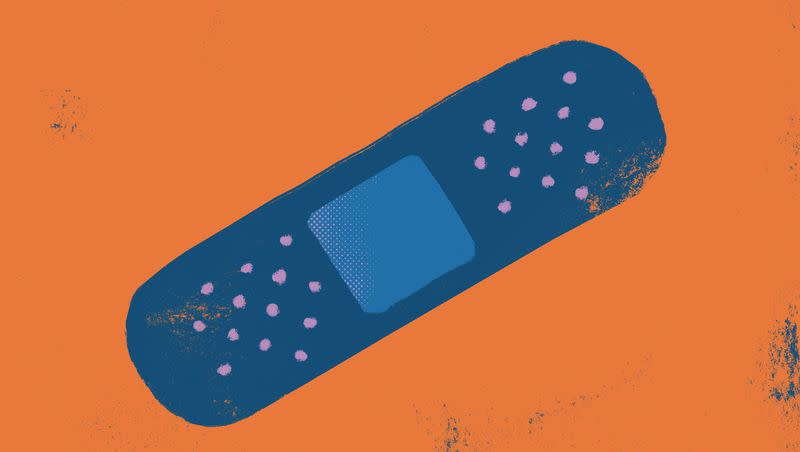Perspective: Progressives, C.S. Lewis and the ‘problem of pain’

- Oops!Something went wrong.Please try again later.
- Oops!Something went wrong.Please try again later.
- Oops!Something went wrong.Please try again later.
In much of today’s progressive politics, the highest moral good seems to be the elimination of human suffering and pain. To some, this is not an abstract concept, but a moral imperative.
While it may sound like science fiction, the British philosopher David Pearce promotes the transhumanist idea that we must merge the human body with machines to eliminate pain altogether, going as far as to say that “the world’s last unpleasant experience will be a precisely dateable event.”
Proponents of what is called “The Abolitionist Project” believe that both physical and mental suffering can be eliminated using drugs and genetic engineering.
This thinking can lead down an ominous path. Historian and philosopher Yuval Noah Harari believes that as human cognitive processes shrink relative to the power of computers, a “new massive class of useless people” will emerge, making humans “redundant,” with the only solution to “excess” people being “to keep them happy with drugs and computer games.”
The audience at his TED Talk laughed, and thankfully, Harari smiled and conceded that “this doesn’t sound like a very appealing future.” But his philosophies, like those of Pearce and others, are not without consequence.
The idea that we should (or even could) eradicate all pain, particularly social pain, inevitably leads to a dangerous antihuman view. And this sentiment is growing far too common, to the point that we see it reflected both in our social fabric and even in public policy.
Related
For example, the social acceptance of abortion promotes the idea that both men and women should never have to deal with the sometimes painful consequences of sex outside of marriage.
Death can now be a programmable event as medically assisted suicide has become accepted in Canada and in parts of the U.S., in large part because of the desire to relieve the dying from suffering.
While prescription and over-the-counter drugs provide much-needed relief for people in pain, more than 59 million Americans — that’s 21% of people 12 and older — used illegal drugs or misused prescription drugs in the past year, according to the National Center for Drug Abuse Statistics. The alarming rise of drug overdose deaths is due, in part, to people seeking relief from the pain of ordinary life to the point of addiction.
For too many people, the drugs of the drug-and-video-game future envisioned by Harari, tragically, are already here.
Nonetheless, I must clearly state that we do have a moral obligation to alleviate, and when possible, prevent suffering, not just the suffering of human beings but of all sentient creatures. But when the obliteration of all pain — both physical and emotional — becomes an overriding goal to the point of numbly diminishing the value of life, it seems time to step back and reevaluate the project.
For example, the pain-free world that these philosophers envision would have no place for the Michigan couple who recently chose to continue a pregnancy of conjoined twins, even knowing that the babies would not survive. There was considerable pain in this decision, but there was also joy and intrinsic value in each little one’s life, no matter how short-lived.
Thus, we come to “The Problem of Pain” that C.S. Lewis wrote about: there isn’t much life to be had without it, however bitter that pill is to swallow. “Try to exclude the possibility of suffering which the order of nature and the existence of free wills involve, and you find that you have excluded life itself,” the great Christian apologist said.
Of course, most of us — myself included — are all cowards when it comes to pain, as Lewis said of himself. We will do anything and everything to avoid it, subdue it and to rid ourselves of it. Lewis wrote that he would “crawl through sewers” to find a means to end pain.
Lewis, however, also saw that the compulsion to completely avoid pain can likewise become a vice, and said that “every vice leads to cruelty.” That ultimate cruelty shines explicitly in Harari’s own words when he said, “The big political and economic question of the 21st century will be what do we need humans for?”
Robert Louis Stevenson gave an answer in his famous novella “The Strange Case of Dr. Jekyll and Mr. Hyde.”
In his confession, the protagonist, Dr. Jekyll, writes that when he discovered his evil double, Mr. Hyde (his hidden self), with chemical alterations to mind and body, he originally aimed to find “the relief of sorrow and suffering.”
But the medically induced search for the relief of pain only led to an embrace of his “original evil,” culminating in a loss of self, a murder and his ultimate suicide.
Of course, in the novella, we only learn what happened from other characters who tell the story, which reminds us that we need each other in order to live, to thrive and to exist beyond machines and video games.
If we live out our life on medicine, as Dr. Jekyll did, or pleasantly spend our days playing video games without knowing suffering or hardship, we might experience the sort of life that the people behind “The Abolitionist Project” envision. But such a life will be completely devoid of meaning, and thus devoid of joy. The crusade against pain, as well as meaning as it seems, might ultimately bring more painful consequences than we know.
Scott Raines is a writer and doctoral student at the University of Kansas.

